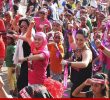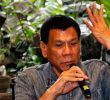1999 was a year coloured by the mass movement vibrantly participated by sectoral organizations echoing to the fore the basic issues of the grassroots especially the poor peasants and indigenous peoples in Southern Mindanao. Specific to the cause is the defence of ancestral lands of the indigenous peoples affected by large-scale mining, corporate farm plantations and unrestricted logging.
Interestingly, it was in 1999 that a first high ranking official of the state and his aide were captured, General Victor Obillo and Captain Alex Montealto, were held prisoners of war by the local unit of the New People’s Army of the Communist Party of the Philippines in the mountains of Southern Mindanao led by now slain Leoncio Pitao, Ka Parago to the masses whom he served for the last 37 years. In this instance, that a closer look at the operations of the revolutionaries in handling prisoners of war was shared to the public.
It was this event in the life story of the open mass movement that all groups and individuals interested in pursuing a just and lasting peace became more prominent as they joined the campaign in the safe release of the POWs. The campaign launched by a people-led alliance, the People’s Initiative for the Release of Obillo and Montealto (PINROM) where faith-based organizations-Roman Catholics, protestants and Muslims, business groups and professional and school organizations were engaged up to the last hour of the actual release.
Discussions on the protocols in the handling of the POWs and their release as enshrined in the international legal instrument, the International Humanitarian Law (IHL), enlightened the participants in the campaign, if not the general population. This in effect made the custodial unit led by Pitao in high profile adulation as the two officials were in good shape and safely turned over to the local government unit witnessed by the various participating groups including national government officials upon clearance of the ICRC representative.
In contrast, on June 28, 2015, Leoncio Pitao met his death by the firing unit of the military in his physical self unable to defend due to illnesses. He who was so conscious of the rules of war was attacked in the most vulnerable moment of his revolutionary life.
Ka Parago spent his early young adulthood working with the poor peasants and indigenous peoples in the hinterlands of Southern Mindanao and nearby areas. Stories of the community people reveal his level of integration with the rural folks – community organizing experiences, group work in meetings with community leaders, facilitating crime resolutions, and welfare services in times of emergencies. Practically, he developed skills associated to social work with communities and organizations, not to mention his brand of alliance work in the countryside. Coordination and networking to serve the interests of the poor sectors of the communities he covered imprinted largely in the minds of the masses- that their endearment to him, Tatay is apt.
Endearment as it is, Tatay, is not a feudal expression but a respect to an older person who openly took up family and community issues with scientific basis using fundamental knowledge of dialectics, analysis of concrete conditions and historical perspective. He who subscribed to collective responsibility and its interplay with individual responsibility dashingly demonstrated the leadership he shared with the masses.
At this point of your departure, thank you very much for the time wholeheartedly, boldly and untiringly spent with the people; respect for the human worth and dignity (guided by IHL) and to the pursuit of national and social liberation.
A grand SALUTE from a co-convenor of PINROM!










